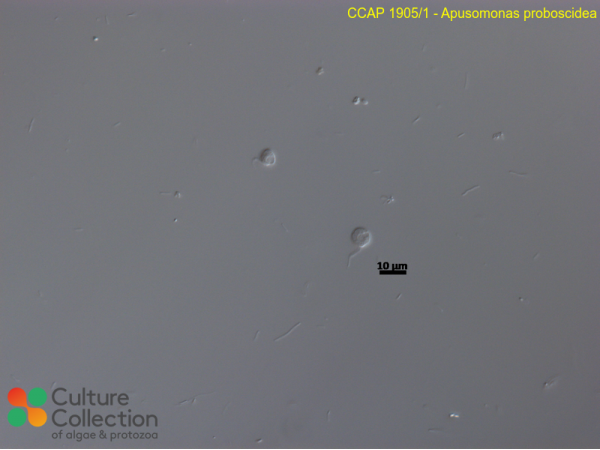References [ 4 ]
Cavalier-Smith T & Chao EE (2010) Phylogeny and evolution of Apusomonadida (Protozoa: Apusozoa): New general and species. Protist 161: 549-576.
Glücksman E, Snell EA & Cavalier-Smith T (2013) Phylogeny and evolution of Planomonadida (Sulcozoa): Eight new species and new genera Fabomonas and Nutomonas. European Journal of Protistology 49: 179-200.
Steenkamp ET, Wright J & Baldauf SL (2006) The protistan origins of animals and fungi. Molecular Biology and Evolution 23: 93-106.
Kim E, Simpson AGB & Graham LE (2006) Evolutionary relationships of apusomonads inferred from taxon-rich analyses of 6 nuclear encoded genes. Molecular Biology and Evolution 23: 2455-2466.
Sequences [ 13 ]
EMBL/Genbank Links
(Bold text = submission by CCAP staff or collaborators)
Division/Phylum: - Class: - Order: Apusomonadida
Note: for strains where we have DNA barcodes we can be reasonably confident of identity, however for those not yet sequenced we rely on morphology
and the original identification, usually made by the depositor. Although CCAP makes every effort to ensure the correct taxonomic identity of strains, we cannot guarantee
that a strain is correctly identified at the species, genus or class levels. On this basis users are responsible for confirming the identity of the strain(s) they receive
from us on arrival before starting experiments.
For strain taxonomy we generally use AlgaeBase for algae and
Adl et al. (2019) for protists.
| Attributes |
| Authority | Alexeieff |
| Isolator | Darbyshire (1971) |
| Collection Site | Orkney Islands, Scotland, UK |
| Notes |
clonal culture; grows better at 10 deg C than 25 deg C |
| Axenicity Status |
Bacteria and other organisms present |
| Area |
Europe |
| Country |
UK |
| Environment |
Soil |
| GMO |
No |
| Group |
Protozoa |
| In Scope of Nagoya Protocol |
No |
| ABS Note |
Collected pre Nagoya Protocol. No known Nagoya Protocol restrictions for this strain. |
| Collection Date |
c 1971 |
| Pathogen |
Not pathogenic: Hazard Class 1 |
| Strain Maintenance Sheet |
|
| Toxin Producer |
Not Toxic / No Data |
| Type Culture |
No |
| Taxonomy WoRMS ID |
|



